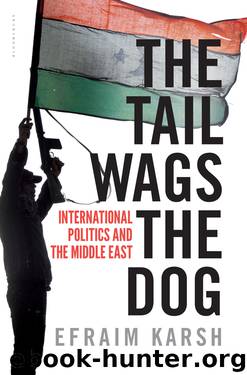The Tail Wags the Dog by Efraim Karsh

Author:Efraim Karsh
Language: eng
Format: epub
ISBN: 9781632861191
Publisher: Bloomsbury Publishing
Published: 2015-04-23T09:02:10+00:00
7. THE LIMITS TO POWER
No regional dispute has attracted a longer and more sustained international intervention than the Arab-Israeli conflict, and few conflicts have been more impervious to outside influence than this century-long feud. As early as the 1920s and 1930s Arab violence frustrated the League of Nations’ decision to establish a Jewish national home in Palestine and drove Britain, the foremost world empire of the day and the League’s appointee to facilitate this goal, not only to abdicate this obligation but to become a foremost opponent of Jewish statehood. It did the same in November 1947 when the League’s successor, the United Nations, voted to partition Palestine into two states – one Jewish the other Arab; rejecting this solution, the Arab nations resolved instead to destroy the state of Israel at birth and gain the whole for themselves. ‘The invasion of Palestine by the Arab states was the first armed aggression which the world had seen since the end of the [Second World] War’, Trygve Lie, the first UN Secretary-General, wrote in his memoirs. ‘The United Nations could not permit that aggression to succeed and at the same time survive as an influential force for peaceful settlement, collective security, and meaningful international law’.1 Neither did successive international peacemaking efforts – from the 1949 UN-sponsored Lausanne conference to the 1955 Anglo-American Alpha Project, to the Geneva and Madrid peace conferences of 1973 and 1991 – come anywhere near bridging the wide divide between Arabs and Jews.
The handful of breakthroughs (or seeming breakthroughs) towards mutual reconciliation was a result of direct negotiations between Israel and its Arab adversaries, with the great powers remaining conspicuously absent. Just as the seeds of the March 1979 Egyptian-Israeli peace treaty were planted in secret talks between Foreign Minister Moshe Dayan and Deputy Prime Minister Hassan Tohami, so the September 1993 Israel–PLO Declaration of Principles (DOP) was reached in secret negotiations in the Norwegian capital of Oslo at a time when the formal and highly publicized US-sponsored peace process launched at the 1991 Madrid conference was virtually deadlocked. Not only did the US administration take no part in the Oslo talks; it was barely aware of their existence, just as seventeen years earlier it had been ignorant of the secret Israeli-Egyptian contacts.
Slide to War
The fact of the matter is that from the very beginning the Arabs’ primary instrument for opposing Jewish national aspirations was violence, and no amount of foreign interference has been able to change this reality. Rather it was the relative success or failure of the use of that instrument in any given period that determined Arab politics and diplomacy. When violence backfired spectacularly in 1948, inter-Arab politics in the subsequent two decades were driven by an attempt to undo the consequences of that defeat (or al-Nakba, ‘the catastrophe’, as it is called in Arab parlance) and to bring about the Jewish state’s demise. This culminated in June 1967 in yet another major Arab-Israeli war.
It is true that, as we have seen, the crisis
Download
This site does not store any files on its server. We only index and link to content provided by other sites. Please contact the content providers to delete copyright contents if any and email us, we'll remove relevant links or contents immediately.
| Africa | Americas |
| Arctic & Antarctica | Asia |
| Australia & Oceania | Europe |
| Middle East | Russia |
| United States | World |
| Ancient Civilizations | Military |
| Historical Study & Educational Resources |
Cecilia; Or, Memoirs of an Heiress — Volume 1 by Fanny Burney(32508)
Cecilia; Or, Memoirs of an Heiress — Volume 2 by Fanny Burney(31917)
Cecilia; Or, Memoirs of an Heiress — Volume 3 by Fanny Burney(31900)
The Secret History by Donna Tartt(18962)
Sapiens: A Brief History of Humankind by Yuval Noah Harari(14328)
Leonardo da Vinci by Walter Isaacson(13246)
The Radium Girls by Kate Moore(11980)
Sapiens by Yuval Noah Harari(5334)
How Democracies Die by Steven Levitsky & Daniel Ziblatt(5180)
The Wind in My Hair by Masih Alinejad(5061)
Homo Deus: A Brief History of Tomorrow by Yuval Noah Harari(4877)
Endurance: Shackleton's Incredible Voyage by Alfred Lansing(4726)
Man's Search for Meaning by Viktor Frankl(4515)
The Silk Roads by Peter Frankopan(4495)
Millionaire: The Philanderer, Gambler, and Duelist Who Invented Modern Finance by Janet Gleeson(4427)
The Rape of Nanking by Iris Chang(4177)
Joan of Arc by Mary Gordon(4062)
The Motorcycle Diaries by Ernesto Che Guevara(4057)
Hitler in Los Angeles by Steven J. Ross(3926)
